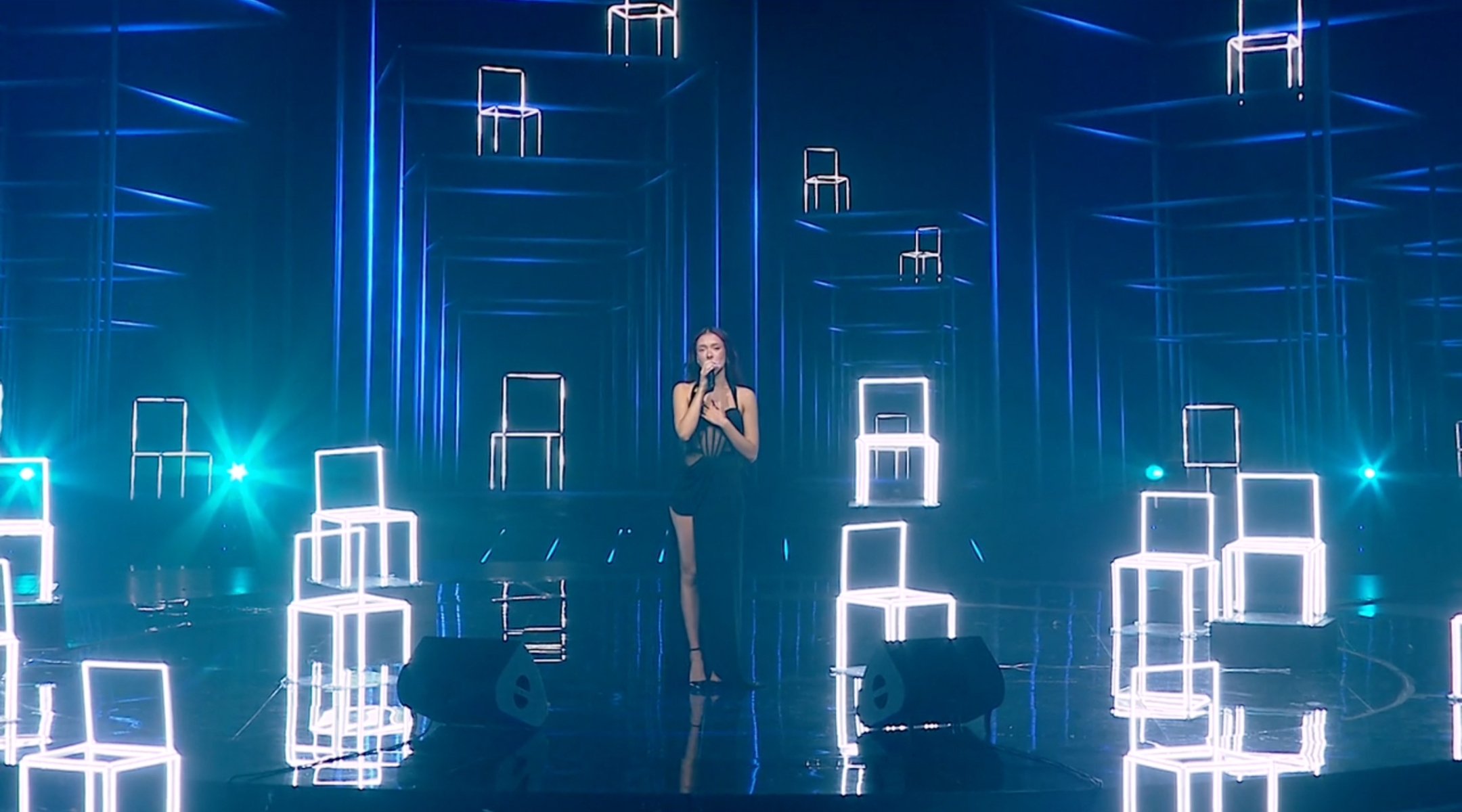Second Israeli song entry for Eurovision in dispute as contest deadline approaches
The dispute over the song is the latest stage in an ongoing controversy over Israel’s participation in the annual competition

Eden Golan performs an emotional rendition of Aerosmith’s “I Don’t Want to Miss a Thing,” surrounded by empty chairs representing the missing hostages, for her grand finale performance to represent Israel in the 2024 Eurovision Song Contest. (Screenshot via Mako.co.il)
(JTA) — Just three weeks after the singer Eden Golan was chosen to represent Israel at Eurovision, her participation in the music competition is in jeopardy because of the song she wants to sing.
The European Broadcasting Union, which runs the competition, declined to accept the first song Israel submitted to the contest because of a ban on political messaging. Now, it has reportedly disqualified Israel’s second-choice song as well, the Israeli publication Ynet reported Wednesday.
A statement from the European Broadcasting Union said it was “still in the process of discussing” Israel’s entry into the competition with Kan, Israel’s public broadcaster.
“That remains a confidential process until a final decision has been reached,” a representative from Eurovision wrote in an email to the Jewish Telegraphic Agency. The final deadline for submitting songs is March 11.
The dispute over the song is the latest stage in an ongoing controversy over Israel’s participation in Eurovision, a popular and campy annual event that Israeli singers have won four times, most recently in 2018. For Israel, participation in the competition is a mark of belonging among the European countries that make up the bulk of competitors. But this year, groups of artists and musicians from a number of European countries have called on Israel to be banned due to the high Palestinian death toll of the Israel-Hamas war.
Now, differences between Eurovision’s leadership and Israeli officials over the song submissions are throwing Israel’s inclusion into question. Both of Israel’s songs were submitted to the EBU in advance. The first-choice song, “October Rain,” was not approved by the EBU, reportedly because it contained a direct reference to Hamas’ Oct. 7 attack on Israel and the terror group’s massacre at an outdoor music festival, Ynet reported. The attack precipitated the war.
The English lyrics of “October Rain,” which were reported by the newspaper Israel Hayom, include the lines: “Who told you boys don’t cry / Hours and hours / and flowers / Life is not a game for the cowards.” (“Flowers” is Israeli military slang for fallen soldiers.)
Initially, Kan said that it had “no intention of replacing the song,” and that if it were not approved by the EBU, Israel would not participate in the competition. Apparently, it has not made good on its threat. Kan did not respond to a JTA request for comment
The second-choice song, “Dance Forever,” contains both Hebrew and English lyrics and was co-written by Golan, Yinon Yahel, Ron Biton and May Sfadia. It also alludes to the festival, which came to a gruesome end at sunrise when the massacre began.
“I break all the chains / I’m on the edge now / Watch me fly away / Oh, dance like an angel / Oh, you will remember / That I will dance forever,” read the song’s lyrics. “I will dance again / Oh, dance like an angel / Drowning / in the sunrise.”
The EBU has faced mounting pressure to ban Israel from the competition, which will be held in Malmo, Sweden. Protests have come from Iceland, Denmark, Finland, Norway and Sweden, with petitions and threats to back out of the competition if Israel participates.
“We all have a duty to take a stand against war and murders of civilians as innocent children,” an Icelandic musical association posted to Facebook in December. “We always have a choice not to attach our name to such whether we are individuals or institutions of the state.”
There is precedent for barring a country due to its policies and actions. In previous years, Eurovision has excluded Russia and Belarus from the competition due to their governments’ human rights violations and suppression of the free press.
Songs have also been disqualified for their political messaging, most notably Georgia’s 2009 entry, “We Don’t Wanna Put In” — an unsubtle reference to Russian President Vladimir Putin — performed by the group Stephane and 3G. The competition was held in Moscow that year, following a brief conflict between Russia and Georgia the previous August.
The EBU informed Georgian public broadcaster GPB at the time that the song does “not comply with the rules of the competition,” citing that “no lyrics, speeches, gestures of a political or similar nature shall be permitted.”
The Georgian broadcaster countered that the song “does not contain political statements” and declined to change the lyrics. It sat out that year’s competition.
This article originally appeared on JTA.org.
A message from our Publisher & CEO Rachel Fishman Feddersen

I hope you appreciated this article. Before you go, I’d like to ask you to please support the Forward’s award-winning, nonprofit journalism so that we can be prepared for whatever news 2025 brings.
At a time when other newsrooms are closing or cutting back, the Forward has removed its paywall and invested additional resources to report on the ground from Israel and around the U.S. on the impact of the war, rising antisemitism and polarized discourse.
Readers like you make it all possible. Support our work by becoming a Forward Member and connect with our journalism and your community.
— Rachel Fishman Feddersen, Publisher and CEO

























